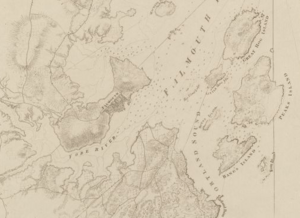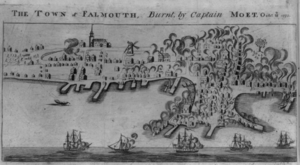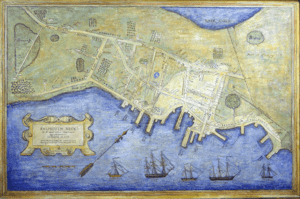Burning of Falmouth facts for kids
| Part of the American Revolutionary War | |

A map from 1777 showing Falmouth (now Portland, Maine)
|
|
| Date | October 18, 1775 |
|---|---|
| Location | Falmouth, Massachusetts (present-day Portland, Maine) |
| Participants | Henry Mowat |
The Burning of Falmouth happened on October 18, 1775. It was an attack by the British Royal Navy on the town of Falmouth, Massachusetts. Today, this place is known as Portland, Maine.
Captain Henry Mowat led the British ships. They first fired cannons at the town, using special cannonballs that started fires. Then, a group of soldiers landed to burn down more buildings. This attack was meant to punish towns that supported the American colonists fighting for independence.
News of this attack made the American colonies even more determined to break away from British rule. It also led the Second Continental Congress to create the Continental Navy. This was the start of the American navy.
Contents
Why Did the Attack Happen?
After the battles of Lexington and Concord in April 1775, the British army was stuck in Boston. They were surrounded by American forces. The British navy, led by Vice-Admiral Samuel Graves, brought supplies to Boston. Their job was also to stop the growing rebellion.
Captain Henry Mowat had been in Falmouth (now Portland, Maine) before. In May 1775, local American Patriots had captured British supply ships there. Admiral Graves ordered Mowat to "burn and destroy" seaport towns that helped the rebels. He specifically mentioned Falmouth.
The Journey to Falmouth
Mowat left Boston Harbor on October 6, 1775. He sailed with his ship, HMS Canceaux, and four other British ships. He decided not to attack other towns because their buildings were too spread out for his cannons to hit easily.
On October 16, Mowat's ships arrived near Falmouth harbor. The people of Falmouth had different feelings about the British ships. Some thought there was no danger, but others remembered past conflicts and were worried.
The next day, Mowat moved his ships closer to the town. He sent a message ashore. It said he was there to "punish" the people for being "rebellious." He gave them two hours to leave their homes.
The townspeople begged Mowat for mercy. He said he would not fire if they promised to be loyal to King George and gave up all their weapons. The people started to leave the town. They did not promise loyalty, and only a few old guns were given up.
The Attack Begins
Mowat's deadline was 9 am on October 18. By 9:40 am, the town looked empty. Mowat raised a red flag and ordered his ships to start firing.
The ships fired special cannonballs that started fires. They hit the harbor and most of the town's houses and public buildings. One person who saw it said:
- "The firing began from all the vessels with all possible briskness."
- "A horrible shower of balls… bombs, carcasses, live shells, grapeshot and musketballs."
- "The firing lasted… until six o'clock."
When the cannons didn't destroy enough, Mowat sent soldiers ashore. Their job was to burn any buildings that were still standing. The local town militia could not fight back much. Most of them were busy helping their families get to safety.
By evening, Mowat reported that "the body of the town was in one flame." The British ships fired about 3,000 cannonballs at Falmouth over nine hours.
What Happened Next?
After the attack, Mowat sailed to another town called Boothbay, Maine. He burned a few houses there and took some farm animals. But his mission was ending. Some of his ships were damaged from firing their cannons so much.
Mowat returned to Boston. Admiral Graves, Mowat's boss, was removed from his command in December 1775. These kinds of attacks on towns slowly stopped.
How Much Damage Was Done?
More than 400 buildings and houses in Falmouth were burned or destroyed. Mowat reported that 11 small ships in the harbor were destroyed, and four were captured. Only one British soldier was killed and one was wounded.
The people of Falmouth were left without homes for the winter. A visitor a month later said there was "no lodging, eating or housekeeping in Falmouth."
On October 26, the town created a group to help the families who lost everything. Over 1,000 people were left homeless. The Massachusetts government gave money and corn to help them. Years later, in 1784, the people of Falmouth began to rebuild. By 1797, over 400 homes and many other buildings were rebuilt.
The town estimated their losses from the attack were over £50,000. This was a huge amount of money back then. Later, in 1791, the U.S. Congress gave the people of Falmouth two pieces of land as payment for their losses. These lands became the towns of New Portland, Maine and Freeman.
How Did People React?
News of the attack made people in the colonies very angry. Mowat was called a "monster" in newspapers. People said the British were trying to "butcher and destroy" all Americans.
George Washington, the leader of the American army, heard about the attack. He called it "an Outrage exceeding in Barbarity & Cruelty."
The Massachusetts government allowed private ships to attack British navy ships. The Second Continental Congress also heard about the attack. This news, along with King George's declaration that the colonies were in rebellion, made Congress act.
The attack on Falmouth pushed Congress to create the Continental Navy. On October 30, they approved commissioning two ships "for the protection and defense of the united Colonies." This event is seen as a key moment in the creation of the American Navy.
When the news reached England, some people first thought it was rebel lies. When it was confirmed, Admiral Graves's boss, Lord George Germain, seemed surprised but not angry. Graves was removed from his job in December 1775, partly because he failed to stop American ships.
Some British newspapers criticized the attack. They warned that harsh actions against Americans would only lead to "Ruin, Misery, and Devastation."
The French government, who was watching events in America closely, also heard about it. The French foreign secretary said he could "hardly believe this absurd as well as barbaric procedure" from a civilized nation.
Mowat's career suffered because of his actions. He was often passed over for promotions. He later tried to hide or downplay his role in the burning of Falmouth.
Other Similar Attacks
- On August 30, 1775, British Captain James Wallace fired on Stonington, Connecticut. This happened after the townspeople stopped his ship from capturing another vessel.
- Wallace also fired on Bristol, Rhode Island in October 1775. This was because the townspeople refused to give him livestock (farm animals).
 | Ernest Everett Just |
 | Mary Jackson |
 | Emmett Chappelle |
 | Marie Maynard Daly |



